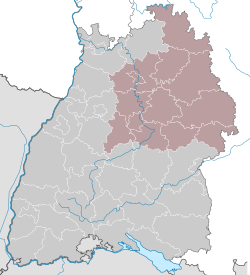Stuttgart (region)
You can help expand this article with text translated from the corresponding article in German. (July 2018) Click [show] for important translation instructions.
|
Stuttgart
Regierungsbezirk Stuttgart | |
|---|---|
 Map of Baden-Württemberg highlighting Stuttgart | |
| Country | Germany |
| State | Baden-Württemberg |
| Region seat | Stuttgart |
| Government | |
| • District President | Susanne Bay (Greens) |
| Area | |
• Total | 10,155.76 km2 (3,921.16 sq mi) |
| Population (31 December 2022)[1] | |
• Total | 4,205,849 |
| • Density | 410/km2 (1,100/sq mi) |
| GDP | |
| • Total | €239.471 billion (2022) |
| Website | https://rp.baden-wuerttemberg.de/rps/Seiten/default.aspx |
Stuttgart is one of the four administrative districts (Regierungsbezirke) of Baden-Württemberg, Germany, located in the north-east of the state of Baden-Württemberg, in the southwestern part of Germany. It is sub-divided into the three regions: Heilbronn-Franken, Ostwürttemberg and Stuttgart.
| Kreise (districts) |
Kreisfreie Städte (district-free towns) |
|---|---|
The districts of Böblingen, Esslingen, Ludwigsburg, Rems-Murr and Göppingen form with the city of Stuttgart the Verband Region Stuttgart with a directly elected regional assembly (Regionalversammlung).
Economy
[edit]The Gross domestic product (GDP) of the region was 213.4 billion € in 2018, accounting for 6.4% of German economic output. GDP per capita adjusted for purchasing power was 47,400 € or 157% of the EU27 average in the same year. The GDP per employee was 123% of the EU average. This makes it one of the wealthiest regions in Germany and Europe.[3]
References
[edit]- ^ "Bevölkerung nach Nationalität und Geschlecht am 31. Dezember 2022" [Population by nationality and sex as of December 31, 2022] (CSV) (in German). Statistisches Landesamt Baden-Württemberg. June 2023.
- ^ "EU regions by GDP, Eurostat". Retrieved 18 September 2023.
- ^ "Regional GDP per capita ranged from 30% to 263% of the EU average in 2018". Eurostat.
